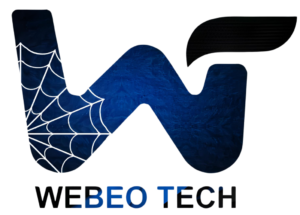How to Build an Effective Digital Marketing Strategy for Your Business
In the ever-evolving digital landscape, having a robust digital marketing strategy is essential for businesses of all sizes. A well-crafted strategy helps you connect with your audience, build brand awareness, and drive conversions. At Webeo Tech, a leading website development and software development agency, we understand the intricacies of digital marketing and how to leverage it effectively. In this blog, we’ll outline the key steps to building an effective digital marketing strategy for your business.
1. Define Your Goals and Objectives
Before diving into digital marketing, it’s crucial to define clear goals and objectives. What do you want to achieve? Common objectives include:
- Increasing website traffic
- Generating leads or sales
- Building brand awareness
- Improving customer engagement
Setting SMART goals—Specific, Measurable, Achievable, Relevant, and Time-bound—will provide you with a clear direction and help you measure success along the way.
2. Understand Your Target Audience
Knowing your target audience is vital for crafting a successful digital marketing strategy. Conduct market research to identify demographics, interests, behaviors, and pain points of your ideal customers. Creating detailed buyer personas can help you understand who you are marketing to and tailor your messaging accordingly.
3. Conduct a Competitive Analysis
Analyzing your competitors can provide valuable insights into what works and what doesn’t in your industry. Evaluate their digital marketing strategies, including:
- Website design and user experience
- Content quality and engagement
- Social media presence
- SEO practices
Understanding your competitors’ strengths and weaknesses will help you identify opportunities to differentiate your brand and find gaps in the market.
4. Choose Your Digital Marketing Channels
With numerous digital marketing channels available, it’s essential to choose the ones that align with your goals and target audience. Some popular channels include:
- Search Engine Optimization (SEO): Improving your website’s visibility in search engine results to drive organic traffic.
- Content Marketing: Creating valuable content, such as blogs, videos, and infographics, to attract and engage your audience.
- Social Media Marketing: Utilizing platforms like Facebook, Instagram, Twitter, and LinkedIn to connect with your audience and promote your brand.
- Email Marketing: Building an email list to communicate with customers, share updates, and promote products or services.
- Pay-Per-Click (PPC) Advertising: Running targeted ads on search engines and social media to drive traffic and conversions.
5. Develop a Content Strategy
Content is at the heart of digital marketing. A well-defined content strategy will help you create, distribute, and promote content that resonates with your audience. Consider the following:
- Content Types: Determine the types of content you will produce, such as blog posts, videos, podcasts, or infographics.
- Content Calendar: Create a content calendar to plan and schedule your content in advance. This helps maintain consistency and ensures you cover relevant topics.
- Quality Over Quantity: Focus on producing high-quality, valuable content that addresses your audience’s needs and challenges. Engaging content will encourage shares and foster brand loyalty.
6. Optimize for SEO
Search engine optimization (SEO) is crucial for improving your website’s visibility and attracting organic traffic. Optimize your website by:
- Conducting Keyword Research: Identify relevant keywords and phrases your target audience is searching for.
- On-Page SEO: Optimize title tags, meta descriptions, header tags, and content with targeted keywords to improve search rankings.
- Technical SEO: Ensure your website is mobile-friendly, has a fast loading speed, and has a clear site structure for better user experience.
7. Implement and Monitor Your Strategy
Once your digital marketing strategy is in place, it’s time to implement it. Use analytics tools, such as Google Analytics, to monitor key performance indicators (KPIs) and track your progress toward your goals. Key metrics to monitor include:
- Website traffic
- Conversion rates
- Bounce rates
- Social media engagement
- Email open and click-through rates
8. Adjust and Optimize
Digital marketing is not a one-time effort; it requires continuous monitoring and optimization. Regularly review your strategy’s performance and adjust based on your findings. Analyze what works, what doesn’t, and why. Be prepared to pivot your strategy to stay relevant and effective in the fast-paced digital environment.
9. Invest in Professional Assistance
Building an effective digital marketing strategy can be complex and time-consuming. If your team lacks the expertise or resources, consider partnering with a digital marketing agency like Webeo Tech. Our experienced professionals can help you develop and execute a tailored digital marketing strategy that aligns with your business goals.
Conclusion
An effective digital marketing strategy is essential for driving growth and success in today’s competitive landscape. By defining your goals, understanding your audience, choosing the right channels, and continuously optimizing your efforts, you can create a powerful digital presence for your brand. At Webeo Tech, we specialize in helping businesses develop and implement effective digital marketing strategies. If you’re ready to take your digital marketing to the next level, contact us today!

